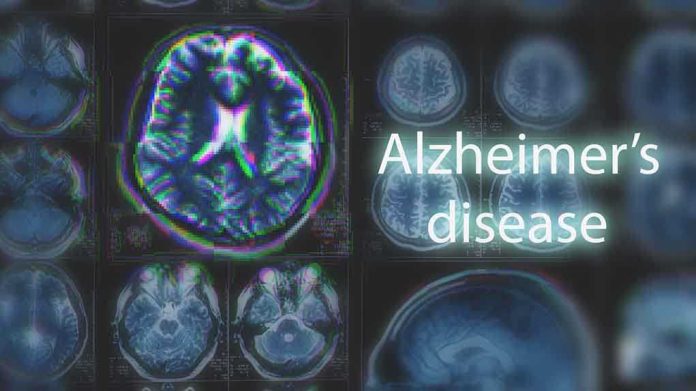
Scientists warn that microplastics are invading our brains at record levels—potentially fueling a surge in dementia and exposing the real cost of years of unchecked globalist environmental neglect.
Story Highlights
- Groundbreaking 2025 study reveals a 50% spike in microplastics inside human brains over just eight years.
- Experts fear a potential link between brain microplastics and rising rates of dementia and neurodegenerative diseases.
- Researchers call for urgent action as evidence mounts that previous hands-off policies have put American health at direct risk.
- Microplastics now found at higher levels in the brain than in any other organ, raising concerns about government oversight and regulatory priorities.
Microplastics Surge in Human Brains—A Crisis Years in the Making
In October 2025, University of New Mexico Health Sciences researchers published a study exposing a dramatic increase in microplastics found within human brains, with levels soaring by 50% between 2016 and 2024. These synthetic fragments, some as small as a virus, are now accumulating in the brain at higher concentrations than in the liver, kidneys, or even the placenta. For American families who have watched unelected bureaucrats and global policymakers ignore the long-term damage of plastic pollution, this revelation is both a vindication of longstanding concerns and a damning indictment of failed environmental stewardship.
Microplastics—tiny particles less than 5 millimeters in size—have infiltrated nearly every aspect of modern life, from our drinking water to the food on our tables. While previous studies uncovered these particles in organs like the kidneys, blood, and testes, scientists long assumed the blood-brain barrier would shield the brain from such contamination. The new findings shatter that assumption, revealing that even the most protected human organs are not immune to the consequences of decades of globalist waste, regulatory complacency, and misplaced environmental priorities. The study’s lead, Dr. Matthew Campen, described the rise as “exponential,” warning that the health risks may just be coming into focus for the American public.
Unanswered Questions About Public Health and Government Accountability
Researchers now suspect that these microplastics could interfere with brain function, potentially fueling the rise in dementia and other neurodegenerative diseases. While causation has not been definitively proven, the correlation is alarming enough for scientists and health advocates to demand immediate investigation and action. Yet, the reality is that for years, policymakers obsessed over abstract climate deals and international summits while ignoring the mounting evidence that plastics were infiltrating our bodies. The result: a growing public health crisis that strikes at the heart of American families, seniors, and children—groups who have always borne the brunt of failed top-down policies.
Calls for government intervention are intensifying, but Americans—especially those who value common sense and limited government—are right to question whether the same agencies that allowed this threat to escalate can be trusted to solve it. Plastic manufacturers and their allies have long resisted meaningful reforms, while environmental organizations focused their energy on global pacts rather than practical solutions that would actually protect U.S. communities. Now, as the consequences become impossible to ignore, families are left demanding answers about regulatory failures and misplaced priorities.
Impact on American Communities and the Path Forward
The implications of this research reach far beyond the laboratory. If the link between microplastics and brain disease is confirmed, the U.S. could face a surge in dementia cases, skyrocketing healthcare costs, and untold hardship for families. Vulnerable populations—including children and the elderly—are especially at risk, yet for years their concerns were brushed aside by elites and activists more interested in performative policies than real-world results. As policy discussions finally begin to address plastic production and waste, Americans must insist on accountability and science-based reforms that put health and family first.
This crisis also exposes broader failures of globalist thinking and government overreach. For decades, Americans were told to accept plastic pollution as the price of progress, while government agencies expanded their reach but failed in their basic duty to protect citizens. The exponential rise of microplastics in our brains is a direct result of ignoring local needs in favor of international agendas. Moving forward, only policies grounded in American values—personal responsibility, transparency, and genuine stewardship—can restore both public trust and public health.
Expert Voices Demand Accountability and Action
Leading voices in the scientific and medical communities have called this discovery a “game-changer,” with Dr. Campen stating, “This really changes the landscape. It makes it so much more personal.” Environmental scientists warn that the long-term health impact of microplastics could dwarf previous environmental crises, with urgent research now underway to determine the scope of the threat. Yet, as experts highlight the need for further studies, Americans must remain vigilant against attempts to use this crisis as an excuse for more government overreach or to advance unrelated agendas. Instead, the focus must remain on real solutions that protect American families and uphold our nation’s founding principles.
As the public demands answers and accountability, the lesson is clear: only when government returns to its constitutional role—protecting the people, not managing their lives—can these threats be addressed effectively. Americans must continue to question, demand transparency, and refuse to let bureaucratic neglect endanger our children’s future.
Sources:
Scientists sound alarm after making disturbing discovery while studying human brains
UNM Health Sciences: Microplastics in Human Brains
Disturbing Discovery: Human Brains Are Filling Up With Microplastics, and It May Be Causing Dementia

















